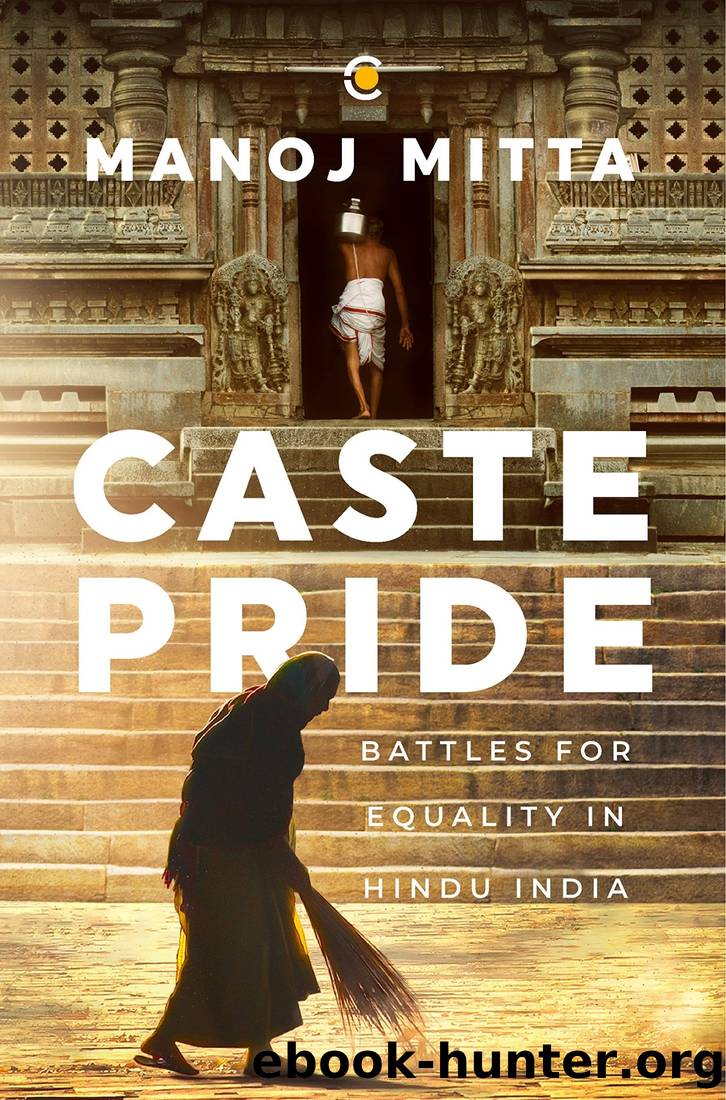Caste Pride: Battles for Equality in Hindu India by Manoj Mitta

Author:Manoj Mitta [Mitta, Manoj]
Language: eng
Format: epub
ISBN: 9789357762946
Publisher: Published by Westland Publications Private Limited
Published: 2023-04-23T18:30:00+00:00
Legislative advancements, such as they were, led to a high-level acknowledgement that untouchability prevailed across British India in varying degrees. The 1930 report of the Simon Commission said: âThe disabilities of the Depressed Classes are undoubtedly most severely felt in Madras, and especially in Malabar. In the latter district is still found the phenomenonânow almost unknown elsewhereâof âunapproachabilityâ.â The next in order of severity, according to the Simon Commission, were the neighbouring Bombay and Central Provinces. In those two provinces, âthe positionâ, it said, âthough no doubt less acute, is probably more or less comparable to that in Madrasâ.39
The Simon Commission, otherwise known as the Indian Statutory Commission, was the first official body to recommend that the dyarchy be replaced by provincial autonomy. In November 1930, the British government invited Indian leaders from across the political spectrum to the Round Table Conference in London, where this and other findings of the commission would be discussed.
But Gandhi and his associates were in jail at the time for their participation in the Civil Disobedience Movement, and so, the Congress boycotted the conference. This resulted in the failure of the First Round Table Conference. The negotiations that followed his release in January 1931 culminated a few weeks later in the famous GandhiâIrwin pact. The Civil Disobedience Movement was called off, and the prospect of the Congress participating in the Second Round Table Conference opened up.
As part of its preparations, the Congress held a special session from 26 to 31 March 1931 at Karachi, where it adopted a resolution on Fundamental Rights for what it called the âSwaraj Constitutionâ. Echoing the Motilal Nehru report of 1928, the Congress Resolution envisaged âequal rights to all citizens in regard to public roads, wells, schools and other places of public resortâ.
The day after the Karachi session had concluded, the Congress Working Committee announced two major decisions. One was to appoint Gandhi as its representative at the next Round Table Conference. The other was to equip Gandhi for his London mission with material elaborating on the Karachi Resolution. To this end, it appointed a Fundamental Rights Committee under C. Rajagopalachari, inviting opinions from provincial units and others.
From this consultative exercise emerged a more nuanced clause on access inequality, enriched by previous debates over the two Madras enactments. On 25 June 1931, the Rajaji committee proposed: âAll citizens have equal rights and duties in regard to wells, roads, schools and places of public resort, maintained out of State or local funds, or dedicated by private persons for the use of the general public.â40 In doing away with the usual qualification of roads and wells with the term âpublicâ, and in coming up with the deft insertion of the term âprivateâ in relation to persons, the Rajaji Committeeâs formulation turned out to be more expansive than those early laws.
Around this time, perhaps driven by the breakthrough in Madras, the Central Provinces saw an attempt to legislate on the access issue. The foremost leader of the untouchables in that province, Ganesh Akaji Gavai, introduced a bill that was more audacious than anything that had been tried in Madras.
Download
This site does not store any files on its server. We only index and link to content provided by other sites. Please contact the content providers to delete copyright contents if any and email us, we'll remove relevant links or contents immediately.
What's Done in Darkness by Kayla Perrin(26587)
The Fifty Shades Trilogy & Grey by E L James(19076)
Shot Through the Heart: DI Grace Fisher 2 by Isabelle Grey(19055)
Shot Through the Heart by Mercy Celeste(18933)
Wolf & Parchment: New Theory Spice & Wolf, Vol. 10 by Isuna Hasekura and Jyuu Ayakura(17107)
Python GUI Applications using PyQt5 : The hands-on guide to build apps with Python by Verdugo Leire(16980)
Peren F. Statistics for Business and Economics...Essential Formulas 3ed 2025 by Unknown(16868)
Wolf & Parchment: New Theory Spice & Wolf, Vol. 03 by Isuna Hasekura and Jyuu Ayakura & Jyuu Ayakura(16815)
Wolf & Parchment: New Theory Spice & Wolf, Vol. 01 by Isuna Hasekura and Jyuu Ayakura & Jyuu Ayakura(16440)
The Subtle Art of Not Giving a F*ck by Mark Manson(14350)
The 3rd Cycle of the Betrayed Series Collection: Extremely Controversial Historical Thrillers (Betrayed Series Boxed set) by McCray Carolyn(14127)
Stepbrother Stories 2 - 21 Taboo Story Collection (Brother Sister Stepbrother Stepsister Taboo Pseudo Incest Family Virgin Creampie Pregnant Forced Pregnancy Breeding) by Roxi Harding(13615)
Scorched Earth by Nick Kyme(12765)
Drei Generationen auf dem Jakobsweg by Stein Pia(10961)
Suna by Ziefle Pia(10886)
Scythe by Neal Shusterman(10333)
International Relations from the Global South; Worlds of Difference; First Edition by Arlene B. Tickner & Karen Smith(9518)
Successful Proposal Strategies for Small Businesses: Using Knowledge Management ot Win Govenment, Private Sector, and International Contracts 3rd Edition by Robert Frey(9364)
This is Going to Hurt by Adam Kay(9179)
